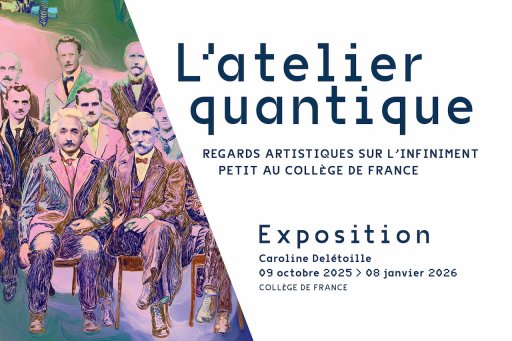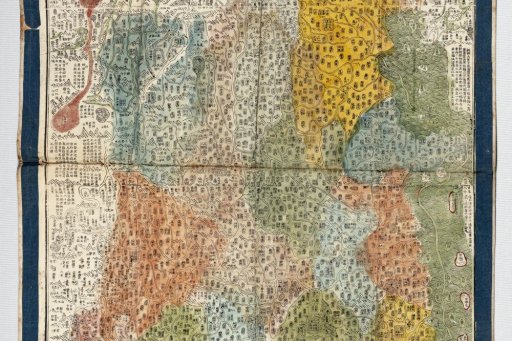Screenshot from the Omnia website.
Omnia, Salamandre and Colligere... over the past ten years, the libraries and archives of the Collège de France have been developing a digital offering that grows every year. Salamandre, an open-access online digital library, offers over 36,000 documents, plus 500 audio and video files. The Colligere blog currently features 90 articles. Omnia gives registered readers access to a large corpus of databases, articles, books and chapters, often in full text.
Omnia
In addition to the printed books and journals acquired each year, the Collège de France libraries are also enriched by numerous online resources in their fields of excellence. All these resources, whether paying or open access, can be accessed by querying the Collège's discovery tool, called Omnia.
The library reader's card is the key to accessing this anthology of databases, articles, books and chapters, often in full text.
Omnia takes its name from the institution's motto " Docet omnia ", which translates as "we teach everything". This motto was coined by Guillaume Budé, the great Renaissance humanist, when, in 1530, he proposed the creation of the Collège royal to King François1er. From that time onwards, the Collège taught subjects such as Greek and Hebrew that were excluded from university lectures.
Always sensitive to readers' needs, and particularly during this period of confinement, the Bibliometrics and Online Resources department of the Direction des bibliothèques, archives et collections (DBAC) has pointed out the many initiatives taken by publishers to make digital journals and books, usually subject to a charge, available on an open-access and temporary basis. This list is regularly updated. If you would like to add to it, please let us know of any resources that we may have missed.
On the Omnia home page, you'll find a List of available databases, as well as a Tutorial on online resources.
These include, for example, the archives of the MathScienceNet database, reference encyclopedias from Brill in both Chinese and religious studies, the Japanese database JapanKnowledge, full-text books by professors at the Collège de France published by OpenEdition, EBSCO or Numérique Premium, the archives of humanities journals on the Jstor platform, and many other resources.
During this special period, the Collège libraries are offering students from Masters level upwards, as well as researchers, teachers and academics, the opportunity to register remotely, by contacting: ressources.electroniques@college-de-france.fr.
Salamandre
Inaugurated in 2013 with the support of the Fondation de l'Orangerie, Salamandre is both a digital heritage library and a catalog of the Collège de France archives.
Salamandre allows you to discover over 36,000 digitized documents, as well as 500 video and audio files, and is regularly enriched with new content from the precious holdings of archives and specialized libraries.
Some of these documents deal with the history of the institution: lecture posters from the 17thcentury onwards, reports on candidates for professorship, registers of assemblies recording the decisions of professors from 1674 to 1950. Others illustrate the variety of research carried out at the Collège in the 19th and early 20thcenturies in archaeology, biology, physics and many other disciplines.
Stampings of inscriptions on Chinese monuments, glass plates recounting excavation campaigns in South America, or the work on movement of Étienne-Jules Marey, physician and precursor of cinema, a Korean world map dating from the 18thcentury , over 500 hours of lectures, seminars and conferences from the 1930s to the 1990s: this is just a glimpse of what you can discover on Salamandre!
Salamandre is also the Collège de France's online catalog of scientific and historical archive inventories, which you can consult to prepare your research.
It takes its name from the family emblem of King François1er, and the curious will find all the explanations they need on a page of BnF's virtual exhibitions: http: //expositions.bnf.fr/francoisIer/arret/10.htm
Colligere
Colligere is the blog of the Collège's libraries and archives, launched in early 2017 on the Hypothèses research notebook platform. Colligere aims to present the valuable holdings as well as the research carried out in the libraries and archives of the Collège de France and to describe their activity.
to date, 90 articles have been published, with new posts appearing around three times a month. If you're interested in Amerindian codexes, Chinese prints, the architectural history of the Collège de France, the photographers who accompanied archaeologists to Egypt in the 19thcentury , the description of zeppelins in a Tibetan newspaper in 1940, or the circumstances surrounding the election of Professor Henri Bergson to the Collège de France, this notebook is for you!
During confinement, a selection of handwritten, photographic and audiovisual archives is presented on a regular basis.









